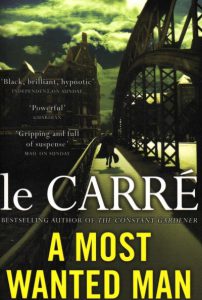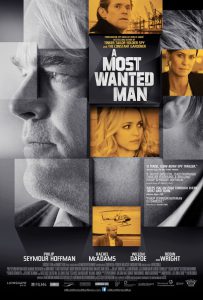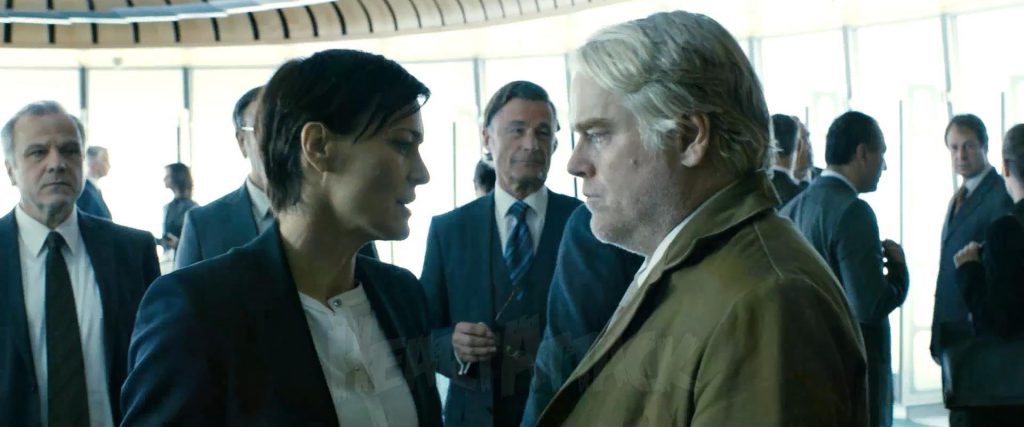 When Issa, a young Chechen, clandestinely disembarks in Hamburg on a boat coming from Sweden, he is a troubled man. On the verge of madness, he has been jailed and tortured in both Russia and Turkey where he has been convicted of terrorism for reasons unknown to the reader. Not surprisingly given that background, Issa isn’t exactly the trusting type. And, when at some point, he contacts a lawyer, Annabel Richter, he does so with one precise – albeit obscure – goal, to serve as an intermediary with Tommy Brue, an old-fashioned private banker indebted to his natural father. The reader doesn’t know much of Issa’s convoluted background. But neither do intelligence services for that matters. They nonetheless acquire an interest in him given his past association with terrorism, the fact that he is an “illegal” migrant, and their perception of him as an Islamist radical. Amongst them, is Günther Bachmann, from a special service within German intelligence services.
When Issa, a young Chechen, clandestinely disembarks in Hamburg on a boat coming from Sweden, he is a troubled man. On the verge of madness, he has been jailed and tortured in both Russia and Turkey where he has been convicted of terrorism for reasons unknown to the reader. Not surprisingly given that background, Issa isn’t exactly the trusting type. And, when at some point, he contacts a lawyer, Annabel Richter, he does so with one precise – albeit obscure – goal, to serve as an intermediary with Tommy Brue, an old-fashioned private banker indebted to his natural father. The reader doesn’t know much of Issa’s convoluted background. But neither do intelligence services for that matters. They nonetheless acquire an interest in him given his past association with terrorism, the fact that he is an “illegal” migrant, and their perception of him as an Islamist radical. Amongst them, is Günther Bachmann, from a special service within German intelligence services.
A most wanted man, originally published in 2008, is John le Carré’s response to the “war on terror”. Unlike its cinematic adaption, a more classic thriller directed by Anton Corbijn, it articulates a vision of the world where lawyers are at the mercy of spies and where law is casually set aside. In the book, Issa is very much the central character.  He is however defenseless, unable to impact on his own situation, dependent on either Annabel or, unknowingly, on Günther. But while Issa is, from the beginning, utterly powerless, Annabel, the lawyer, isn’t much more empowered by her practice of the law. As she will soon realize, law, be it international or national, is a meaningless tool when it comes to protect an “illegal” migrant, especially one who has been associated with terrorism. And, if Annabel keeps on seeing herself as a lawyer, despite the uselessness of the law, it is because of her training and out of sense of loyalty to her client (1.). Günther, the spy, is instrumental to Annabel’s progressive evolution, relentlessly crushing her last hopes that law can be used to defend the weak and powerless. He is not alone in that disregard for law and lawyers. As indicated in the New York’s time review of the book:
He is however defenseless, unable to impact on his own situation, dependent on either Annabel or, unknowingly, on Günther. But while Issa is, from the beginning, utterly powerless, Annabel, the lawyer, isn’t much more empowered by her practice of the law. As she will soon realize, law, be it international or national, is a meaningless tool when it comes to protect an “illegal” migrant, especially one who has been associated with terrorism. And, if Annabel keeps on seeing herself as a lawyer, despite the uselessness of the law, it is because of her training and out of sense of loyalty to her client (1.). Günther, the spy, is instrumental to Annabel’s progressive evolution, relentlessly crushing her last hopes that law can be used to defend the weak and powerless. He is not alone in that disregard for law and lawyers. As indicated in the New York’s time review of the book:
“Bachmann is not the only spy in “A Most Wanted Man”; he swims in a sea of them — German espiocrats and national police; some adroitly verbal Brits, savage but polite; and, at the margin, some Americans, savage and not polite. And, taken together, quite a crew. Do they respect law and lawyers? No, they eat law and lawyers, just for an appetizer.”
Yet, unlike other spies, Günther retains an acute sense of justice. For him, law is subordinated to superior moral imperatives and the necessity to fight effectively against terrorism. But, law remains a valid parameter as long as it aligns with his own views on justice (2.). However, as we’ll see, his sense of justice, crumbles, as much as Annabel’s reliance on the law, when confronted to other actors with different views on the fight against terrorism.
- Annabel Richter: from idealism to realism – law as tool of oppression
 Annabel Richter is a lawyer. And, more than a mere job, that function is an integral part of her identity. If we were to qualify her, it could be said that she is a disillusioned idealist. Annabel comes from a family of lawyers, but unlike her family she set out her career as a lawyer working for the “Sanctuary”, a NGO helping asylum seekers and migrants present their case to German authorities. At the outset of that career, Annabel thought that, unlike her parents, she could wrestle the law out of the hands of the powerful to make it a tool to protect the powerless. However, sooner rather than later, her everyday work has led her to doubt that law could be anything else but a tool “in the grasp of the rich and easy”:
Annabel Richter is a lawyer. And, more than a mere job, that function is an integral part of her identity. If we were to qualify her, it could be said that she is a disillusioned idealist. Annabel comes from a family of lawyers, but unlike her family she set out her career as a lawyer working for the “Sanctuary”, a NGO helping asylum seekers and migrants present their case to German authorities. At the outset of that career, Annabel thought that, unlike her parents, she could wrestle the law out of the hands of the powerful to make it a tool to protect the powerless. However, sooner rather than later, her everyday work has led her to doubt that law could be anything else but a tool “in the grasp of the rich and easy”:
“Annabel’s mother was a district judge, her father a retired lawyer-diplomat in the German foreign service. Her sister Heidi was married to a public prosecutor. Only her elder brother Hugo, whom she adored, had managed to beat the legal rap and become, first a general practitioner, and now a brilliant if wayward psychiatrist who claimed to be the last pure Freudian on earth.
That Annabel, the family rebel, had ever succumbed to the law herself was a continuing mystery to her. Was it to please her parents? Never. Perhaps she had imagined that by entering their profession she could demonstrate her difference from them in a language they understood; that she would wrench the law out of the grasp of the rich and easy, and take it to the people who had most need of it. If so, nineteen months at the Sanctuary had told her how wrong she was.
Sitting out the pitiful kangaroo tribunals, biting her lips as she listened to her clients’ horror stories being picked over by low-ranking bureaucrats whose experience of the outside world amounted to two weeks in Ibiza, she must have known a moment would come – a client would come – that would cause her to abandon every professional and legal principle she had ever reluctantly embraced” (Le Carré, J., A Most Wanted Man, Sceptre, juillet 2014, p. 136).
When Issa arrives in Hamburg, Annabel is thus already largely disillusioned and does not believe law can protect those who need the most protection. In A most wanted man, migrants – and especially Muslim migrants – are seen as potential threats. That much is made abundantly clear during one of Annabel’s first encounters with Günther :
“’Issa Karpov is an Islamist Russian criminal with a long record of convictions for militant actions. He entered Germany illegally – smuggled by other criminals, maybe also Islamist – and has no right in this country, whatever.’
‘Everyone has rights, surely,’ Annabel suggested, in gentle reproof.
‘Not in this situation, Frau Richter. Not in this situation’ (p. 194)
 Migrants have no rights. And while Annabel disputes that assertion when confronted to Günther, she is acutely aware of it as she acknowledges to Tommy Brue, the banker supposed to help Issa:
Migrants have no rights. And while Annabel disputes that assertion when confronted to Günther, she is acutely aware of it as she acknowledges to Tommy Brue, the banker supposed to help Issa:
“‘… Before he ran, the Swedish police took his photograph and fingerprints. You know what that means?’
‘Not yet.’
[..] ‘It means that his fingerprints and photograph are on every police website. It means that under the Dublin treaty of 1990, which you have no doubt read from cover to cover, the Germans have no option but to post him back to Sweden express. No appeal, no due process. He’s an escaped prisoner and illegal immigrant to Sweden, wanted in Russia and Turkey, with a record of Muslim activism. It’s the Swedes not the Germans who get to deport him.’” (p. 100)
During that meeting Annabel thus depicts the European asylum system. Under that regime, amended in Dublin II and Dublin III EU regulations, migrant’s fingerprints are registered in the EURODAC database by the country in which the migrant has entered the European Union. Responsibility for determining refugee status then rests on the entrance country where the migrant is sent back should he leave the country for another in the EU. The automaticity of that forcible return has, famously, led to Belgium’s condemnation by the European Court of Human Rights in M.S.S. v. Belgium and Greece. In that case, the Court had found Belgium to be in violation of article 3 of the Convention for having sent back an asylum seeker to Greece without asserting the risks faced by that person in a country hard-pressed to cope with a large number of asylum seekers. Unlike Greece however, in the absence of reports demonstrating a structural risk of human rights violations for migrants in Sweden, Issa would be sent back, irrespective of any argument Annabel might submit on his behalf. That, in itself, would not be a problem. The problem is that, once sent back, it would be very unlikely that Issa could find a “Swedish Saint”, a white knight willing to defend a convicted terrorist and intercede in his favor. According to her, Issa would unavoidably be sent back to Turkey or Russia for more jail time and torture.
“As far as the Swedes are concerned, he’s an illegal migrant and an absconded terrorist on the run, period.” (p. 100)
That conversation is a turning point for Annabel, as she realizes that law cannot protect Issa. Law, far from protecting the weak, constitutes a tool for oppression:
“‘In my law school, we talked a great deal about law over life,’ she said. ‘It’s a verity of our German history: law not to protect life, but to abuse it. We did it to the Jews. In its current American form, it licenses torture and tate kidnapping. And it’s infectious. […] I am not the servant of that kind of law. I’m the servant of Issa Karpov. He’s my client.” (pp. 101-102)
From that moment on, Annabel gives up reliance on law. Her goal is to defend Issa whatever the means. For Annabel, being a lawyer does not imply the use of the law anymore, it implies dedication to a client in danger, and helping that client at all costs:
“The moment I sat down with Issa and heard his story, I knew that this was where the system stops, that this was the unsavable life I must save, that I must think myself not as a lawyer but as a doctor like my brother Hugo and ask myself: what is my duty to this injured man, what sort of a German lawyer am I if I leave him in the legal gutter to bleed to death [..]?”’ (p. 133)
And a few pages later,
“From the moment he landed in Sweden, Issa became unsavable.
There is no legal process available to him that offers more than an outside hope of salvation. […]
After that, she had made straight for the practicalities: how in pure terms, how in reality, given the situation as it stands, does Annabel Richter, law graduate of the universities of Tübingen and Berlin, perform her solemn duty to her client?” (p.137)
In addition to that dedication, being a lawyer also seems to imply having a set of skills that remain, even when reliance on the law provides no efficient defense. Those meta-skills, such as having an organizational mindset or a supposed ability to rationalize facts, Annabel tries briefly to rely on it:
“Assemble your facts clearly and calmly.
You’re a lawyer.
You may be an outraged woman with a volcano of fury in you waiting to erupt, but it’s the lawyer, not the woman, who will speak for you.” (p. 210)
Yet, only a few paragraphs later, Annabel realizes how futile that defense is, as she is progressively confronted to Günther’s implacable demonstration that, with or without the law, she is powerless in helping Issa. At this stage, Annabel still sees herself as a lawyer. But the law is gone. Lawyering skills are gone. What’s left is a mandate, a mandate to help her client:
“She was his lawyer and she knew nothing but her brief. […]
She was not a judge like her mother, or a diplomatic bigot like her father. She was a lawyer and Issa was her mandate […]” (p. 354)
Annabel starts out the book as idealistic. In that respect, she’s not unlike Tessa Quayle, the lawyer described by Agatha Verdebout in her review of The Constant Gardener, a cinematic adaptation of another book by John Le Carré. However, in A most wanted man, Annabel cannot remain idealistic and is forced to drop all pretense that law serves a higher purpose. Law does not constitute a tool of resistance against oppression, it contributes to oppression. A most wanted man describes a world where migrants have no rights, especially if they are Muslim, especially if they have been convicted for terrorism, as bogus as that condemnation might be…
 That understanding leads Annabel to question her own identity. She epitomizes the idealistic lawyer. Even her name – “Richter” translating as “judge” in German – is an indication of that. But that identity, that of an idealistic lawyer, dissolves as the story unfolds. Giving up on law, Annabel keeps on seeking refuge in her identity as a lawyer, albeit not an idealistic one anymore. But doing so, she admits that this defining trait has more to do with a sense of loyalty towards a client facing injustice than any demonstration of professional ability or any reliance on superior norms, even human rights. From being idealistic, Annabel becomes a realist, ready to use any means to save her client. Playing that game, however, she soon loses out to Günther’s vastly superior means…
That understanding leads Annabel to question her own identity. She epitomizes the idealistic lawyer. Even her name – “Richter” translating as “judge” in German – is an indication of that. But that identity, that of an idealistic lawyer, dissolves as the story unfolds. Giving up on law, Annabel keeps on seeking refuge in her identity as a lawyer, albeit not an idealistic one anymore. But doing so, she admits that this defining trait has more to do with a sense of loyalty towards a client facing injustice than any demonstration of professional ability or any reliance on superior norms, even human rights. From being idealistic, Annabel becomes a realist, ready to use any means to save her client. Playing that game, however, she soon loses out to Günther’s vastly superior means…
2. Günther Bachmann: from realism to idealism – law as a pointless refuge
 Günther Bachmann is a spy. He is a realist. While he does not dispute the existence of the law, he does not hesitate to set it aside, convinced that the fight against terrorism must take precedence over it. Günther is a pragmatic. What matters to him is to use Issa in order to gain access to a much bigger fish, Dr Abdullah, a rich and respected intellectual suspected of financing terrorism. For all that matters to Günther, Issa might well be innocent. What matters, however, is that Issa might constitute the key element required to gather information on Abdullah and on the means through which he finances terrorism. And, to gather that information, Günther is more than willing to break the law, and lawyers, as he ruthlessly explains to Annabel:
Günther Bachmann is a spy. He is a realist. While he does not dispute the existence of the law, he does not hesitate to set it aside, convinced that the fight against terrorism must take precedence over it. Günther is a pragmatic. What matters to him is to use Issa in order to gain access to a much bigger fish, Dr Abdullah, a rich and respected intellectual suspected of financing terrorism. For all that matters to Günther, Issa might well be innocent. What matters, however, is that Issa might constitute the key element required to gather information on Abdullah and on the means through which he finances terrorism. And, to gather that information, Günther is more than willing to break the law, and lawyers, as he ruthlessly explains to Annabel:
“’You want to register your protest now and get it over?’ Bachmann enquired, drawing on his cigarette. ‘Rant about your special status as a lawyer, all that shit? Your amazing privileges, your client confidentiality? How you could get me thrown out on my ear tomorrow? How I’ve broken every rule in the book, which I have? Trampled on the very essence of the Constitution? Are you going to spout all that crap at me, or do we just assume it? Oh, and by the way, when’s your next appointment with the wanted terrorist Issa Karpov whom you’ve secreted in your apartment?’ (p. 213)
Unlike other spies, including British and American ones, Günther is, however, not without ideals. As we’ll see later, convinced that Issa is not a terrorist, he is wiling to help him stay in Germany, provided that Issa assists him in getting information on Abdullah. Moreover, Günther strongly reproves torture – deemed as counter-productive – and the tendency to blur the line between the work of intelligence agencies and law enforcement institutions. Hence, when asked whether the intelligence gathered on Abdullah would allow to prosecute him before American courts, he quickly takes issue with the proposition, criticizing how the American justice system has dealt with persons accused of terrorism after 9/11:
“’Which of your Courts are we talking about here, Martha? Your military tribunals behind closed doors, or the old sort when the accused was allowed to know what he was accused of? ‘“
 Günther Bachmann is an ambiguous character, despising law and lawyers, while at the same time having respect for these. For him, the ultimate test is whether law serves a higher conception of justice. That test, however, takes the law out of the law, as Günther will learn the hard way… If one can disregard the law when justice requires it, then an actor with a different conception of justice may disregard it as he sees fit. In the the final pages of A most wanted man, Günther is confronted to his American counterpart (spoiler alert – the following lines reveal the end of the book). In the closing scene, both Issa and Abdullah have just been arrested/abducted, soon to be transferred to American custody. Shocked by the situation which wasn’t part of his end game, Günther questions the intervention of his American colleague:
Günther Bachmann is an ambiguous character, despising law and lawyers, while at the same time having respect for these. For him, the ultimate test is whether law serves a higher conception of justice. That test, however, takes the law out of the law, as Günther will learn the hard way… If one can disregard the law when justice requires it, then an actor with a different conception of justice may disregard it as he sees fit. In the the final pages of A most wanted man, Günther is confronted to his American counterpart (spoiler alert – the following lines reveal the end of the book). In the closing scene, both Issa and Abdullah have just been arrested/abducted, soon to be transferred to American custody. Shocked by the situation which wasn’t part of his end game, Günther questions the intervention of his American colleague:
“’Where have you taken him? Bachmann asked.
‘Abdullah? Who gives a shit? Some hole in the desert, for all I know. Justice has been rendered man. We can all go home.’
He had spoken these last words in English but Bachmann, in his dazed state failed to get his mind round them.
‘Rendered? he repeated stupidly. ‘What’s rendered? What justice are you talking about?
American justice, asshole. Whose do you think? Justice from the fucking hip, man. No-crap justice, that kind of justice! Justice with no fucking lawyers around to pervert the course. Have you never heard of extraordinary rendition? Time you Krauts had a word for it. Have you given speaking or what?’
But still nothing came out of Bachmann, so Newton went on:
‘Eye for a fucking eye, Günther. Justice as retribution, okay? Abdullah was killing Americans. We call that original sin. You want to play softball spy games? Go find yourself some Euro-pygmies.’
‘I was asking you about Issa,’ Bachmann said.
Issa was air, man’ Newton retorted, now seriously angry. ‘Whose fucking money was it anyway? Issa Karpov bankrolls terror, period. Issa Karpov sends money to very bad guys.
He just did. Fuck you, Günther. Okay?’ But he seemed to feel he hadn’t quite made his point: ‘How about those Chechen militants he hung out with? Eh? You’re telling me they’re a bunch of pussy-cats?’
‘He ‘s innocent’
‘Bullshit. Issa Karpov was one hundred per cent complicit, and a couple of weeks from now, if he lasts that long, he’ll admit it.”
In that scene, both Günther and the American know that Issa did not voluntarily fund terrorism. They know it without the faintest doubt, as they were the ones who manipulated him to give money to Abdullah, a man Issa had not even heard about before their intervention. That factor, however, is irrelevant. Issa, having been once associated with terrorism, will always be a terrorist. And justice, American justice, not crap European justice, calls for extraordinary renditions, calls for “enhanced” interrogation methods, calls for getting rid of those pesky lawyers and their annoying formalities… Günther does not agree with those propositions but invoking law after having so casually disposed of it, is, of course, no longer an option.
Law and lawyers as appetizers

Murat Kurnaz
A most wanted man events unfold in Hamburg, a city where John Le Carré lived. A city, where also, Mohammed Atta, prepared the 9/11 attacks. According to Le Carré, the book was Inspired by the life of Murat Kurnaz, Turkish national and longtime German resident who ended up being jailed and detained in Guantanamo despite prompt recognition of his innocence. As explained by the author’s friend, Philippe Sands – whom many readers of this review better know for his contributions to international law –, it addresses what Le Carré considers to be a “gross overreaction to Islamic threat”. A most wanted man thus echoes many contemporary preoccupations. It echoes the temptation to cast as wide a nest as possible in order to stop terrorism, be it at the expense of a few innocent persons. It echoes the treatment reserved to migrants under the EU asylum system. It echoes the temptation to bury one’s head in the sand and to avoid looking too closely at how condemnations for terrorism are obtained in non-EU neighboring States, including condemnations of EU citizens. It echoes the increasing tendency to restrict human rights arguing that the ends justify the means.

Khaled El-Masri
Of course, extraordinary renditions have been condemned by the ECHR in El-Masri v. FYROM. So have some important aspects of the EU Dublin regime in M.S.S as mentioned above. But, A most wanted man doesn’t so much concern those specific points of law as it concerns identities and personal choices. The book constitutes a meticulous account of the choices that individuals face when they try to oppose the maximalist logic of the war on terror. In a most wanted man, law doesn’t protect higher goals. It sanctifies the perceived interests of the State. It treats migrants as irrelevant and empowers intelligence services to crush lawyers when it suits their needs, all in the interest of fighting terrorism and obtaining real justice. In A most wanted man, law and lawyers are nothing more than appetizers for spies, minor hindrances that are disposed of as quickly as possible. Law is at best irrelevant, at worst a tool for oppression, leaving idealistic lawyers with no choice but to give up on it. In that sense, Annabel walks the opposite path of Günther. Whereas the latter briefly seeks refuge in the law after having discarded it, Annabel forsakes it hoping to save her clients through other means. To no avail though, as neither Günther’s newfound willingness to turn to law, nor Annabel’s willingness to give up on it, end up helping Issa.
In its review of the book, the New York times concluded that:
“this is le Carré’s strongest, most powerful novel, which has a great deal to do with its near perfect narrative pace and the pleasure of its prose, but even more to do with the emotions of its audience, what the reader brings to the book.”
We could not agree more. Reading A most wanted man as a lawyer brings up many feelings. Where do we stand when law does not agree with our sense of justice? Are our identities as lawyers conditioned to our reliance on the law, or does our training, our lawyer’s rationalities, live up to circumstances where law is absent or powerless? Those questions probably cannot be answered from an outsider’s perspective. But asking them forces us to question the limits of our profession and of our modes of action in a legal system that reduces those for some categories of individuals.
